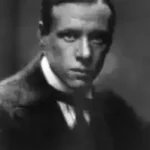 | |
The Willow Walk | |
| Author | Sinclair Lewis |
|---|---|
| Published |
1918
|
| Language | English |
| Nationality | American |
| Genre | Satire, Social Commentary |
1918 Short Story
The Willow Walk
The Willow Walk is an English Satire, Social Commentary short story by American writer Sinclair Lewis. It was first published in 1918. The Willow Walk was featured in The Best Short Stories of 1918. "It has been asserted that when Jasper Holt acted a role he veritably lived it. No one can ever determine how great an actor was lost in the smug bank teller."
The Willow Walk
by Sinclair Lewis
I
From the drawer of his table desk Jasper Holt took a pane of window glass. He laid a sheet of paper on the glass and wrote, Now is the time for all good men to come to the aid of the party. He studied his round business-college script, and rewrote the sentence in a small finicky hand, that of a studious old man. Ten times he copied the words in that false pinched writing. He tore up the paper, burned the fragments in his large ash tray and washed the delicate ashes down his stationary washbowl. He replaced the pane of glass in the drawer, tapping it with satisfaction. A glass underlay does not retain an impression.
Jasper Holt was as nearly respectable as his room, which, with its frilled chairs and pansy-painted pincushion, was the best in the aristocratic boarding house of Mrs. Lyons. He was a wiry, slightly bald, black-haired man of thirty-eight, wearing an easy gray flannel suit and a white carnation. His hands were peculiarly compact and nimble. He gave the appearance of being a youngish lawyer or bond salesman. Actually he was senior paying teller in the Lumber National Bank in the city of Vernon.
He looked at a thin expensive gold watch. It was six-thirty, on Wednesdaytoward dusk of a tranquil spring day. He picked up his hooked walking stick and his gray silk gloves and trudged downstairs. He met his landlady in the lower hall and inclined his head. She effusively commented on the weather.
I shall not be here for dinner, he said amiably.
Very well, Mr. Holt. My, but arent you always going out with your swell friends, though! I read in the Herald that you were going to be star in another of those society plays at the Community Theater. I guess youd be an actor if you wasnt a banker, Mr. Holt.
No, Im afraid I havent much temperament. His voice was cordial, but his smile was a mere mechanical sidewise twist of the lip muscles. Youre the one thats got the stage presence. Bet youd be a regular Ethel Barrymore if you didnt have to look out for us.
My, but youre such a flatterer!
He bowed his way out and walked sedately down the street to a public garage. Nodding to the night attendant, but saying nothing, he started his roadster and drove out of the garage, away from the center of Vernon, toward the suburb of Rosebank. He did not go directly to Rosebank. He went seven blocks out of his way, and halted on Fandall Avenueone of those petty main thoroughfares which, with their motion-picture palaces, their groceries, laundries, undertakers establishments and lunch rooms, serve as local centers for districts of mean residences. He got out of the car and pretended to look at the tires, kicking them to see how much air they had. While he did so he covertly looked up and down the street. He saw no one whom he knew. He went into the Parthenon Confectionery Store.
The Parthenon Store makes a specialty of those ingenious candy boxes that resemble bound books. The back of the box is of imitation leather, with a stamping simulating the title of a novel. The edges are apparently the edges of a number of pages of paper. But these pages are hollowed out, and the inside is to be filled with candy.
Jasper gazed at the collection of book boxes and chose the two whose titles had the nearest approach to dignitySweets to the Sweet and The Ladies Delight. He asked the Greek clerk to fill these with the less expensive grade of mixed chocolates, and to wrap them.
From the candy shop he went to a drug store that carried an assortment of reprinted novels, and from these picked out two of the same sentimental type as the titles on the booklike boxes. These also he had wrapped. He strolled out of the drug store, slipped into a lunch room, got a lettuce sandwich, doughnuts and a cup of coffee at the greasy marble counter, took them to a chair with a tablet arm in the dim rear of the lunch room and hastily devoured them. As he came out and returned to his car he again glanced along the street.
He fancied that he knew a man who was approaching. He could not be sure. From the breast up the man seemed familiar, as did the customers of the bank whom he viewed through the wicket of the tellers window. When he saw them in the street he could never be sure about them. It seemed extraordinary to find that these persons, who to him were nothing but faces with attached arms that held out checks and received money, could walk about, had legs and a gait and a manner of their own.
He walked to the curb and stared up at the cornice of one of the stores, puckering his lips, giving an impersonation of a man inspecting a building. With the corner of an eye he followed the approaching man. The man ducked his head as he neared, and greeted him, Hello, Brother Teller. Jasper seemed startled; gave the Oh! Oh, how are you! of sudden recognition; and mumbled, Looking after a little bank property.
Always on the job, eh!
The man passed on.
Jasper got into his car and drove back to the street that would take him out to the suburb of Rosebank. As he left Fandall Avenue he peered at his watch. It was five minutes of seven.
At a quarter past seven he passed through the main street of Rosebank, and turned into a lane that was but little changed since the time when it had been a country road. A few jerry-built villas of freckled paint did shoulder upon it, but for the most part it ran through swamps spotted with willow groves, the spongy ground covered with scatterings of dry leaves and bark. Opening on this lane was a dim-rutted grassy private road, which disappeared into one of the willow groves.
Jasper sharply swung his car between the crumbly gate posts and along the bumpy private road. He made an abrupt turn, came into sight of an unpainted shed and shot the car into it without cutting down his speed, so that he almost hit the back of the shed with his front fenders. He shut off the engine, climbed out quickly and ran back toward the gate. From the shield of a bank of alder bushes he peered out. Two chattering women were going down the public road. They stared in through the gate and half halted.
Thats where that hermit lives, said one of them.
Oh, you mean the one thats writing a religious book, and never comes out till evening? Some kind of a preacher?
Yes, thats the one. John Holt, I think his name is. I guess hes kind of crazy. He lives in the old Beaudette house. But you cant see it from hereits clear through the block, on the next street.
I heard he was crazy. But I just saw an automobile go in here.
Oh, thats his cousin or brother or somethinglives in the city. They say hes rich, and such a nice fellow.
The two women ambled on, their chatter blurring with distance. Standing behind the alders Jasper rubbed the palm of one hand with the fingers of the other. The palm was dry with nervousness. But he grinned.
He returned to the shed and entered a brick-paved walk almost a block long, walled and sheltered by overhanging willows. Once it had been a pleasant path; carved wooden benches were placed along it, and it widened to a court with a rock garden, a fountain and a stone bench. The rock garden had degenerated into a riot of creepers sprawling over the sharp stones; the paint had peeled from the fountain, leaving its iron cupids and naiads eaten with rust. The bricks of the wall were smeared with lichens and moss and were untidy with windrows of dry leaves and cakes of earth. Many of the bricks were broken; the walk was hilly in its unevenness. From willows and bricks and scuffled earth rose a damp chill.
But Jasper did not seem to note the dampness. He hastened along the walk to the housea structure of heavy stone which, for this newish Midwestern land, was very ancient. It had been built by a French fur trader in 1839. The Chippewas had scalped a man in its very dooryard. The heavy back door was guarded by an unexpectedly expensive modern lock. Jasper opened it with a flat key and closed it behind him. It locked on a spring. He was in a crude kitchen, the shades of which were drawn. He passed through the kitchen and dining room into the living room. Dodging chairs and tables in the darkness as though he was used to them he went to each of the three windows of the living room and made sure that all the shades were down before he lighted the students lamp on the game-legged table. As the glow crept over the drab walls Jasper bobbed his head with satisfaction. Nothing had been touched since his last visit.
The room was musty with the smell of old green rep upholstery and leather books. It had not been dusted for months. Dust sheeted the stiff red velvet chairs, the uncomfortable settee, the chill white marble fireplace, the immense glass-fronted bookcase that filled one side of the room.
The atmosphere was unnatural to this capable business man, this Jasper Holt. But Jasper did not seem oppressed. He briskly removed the wrappers from the genuine books and from the candy-box imitations of books. One of the two wrappers he laid on the table and smoothed out. Upon this he poured the candy from the two boxes. The other wrapper and the strings he stuffed into the fireplace and immediately burned. Crossing to the bookcase he unlocked one section and placed both the real books and the imitation books on the bottom shelf. There was a row of rather cheap-looking novels on this shelf, and of these at least six were actually such candy boxes as he had purchased that evening.
Only one shelf of the bookcase was given over to anything so frivolous as novels. The others were filled with black-covered, speckle-leaved, dismal books of history, theology, biographythe shabby-genteel sort of books you find on the fifteen-cent shelf at a secondhand bookshop. Over these Jasper pored for a moment as though he was memorizing their titles.
He took down The Life of the Rev. Jeremiah Bodfish and read aloud: In those intimate discourses with his family that followed evening prayers I once heard Brother Bodfish observe that Philo Judæuswhose scholarly career always calls to my mind the adumbrations of Melanchthon upon the essence of rationalismwas a mere sophist
Jasper slammed the book shut, remarking contentedly, Thatll do. Philo Judæusgood name to spring.
He relocked the bookcase and went upstairs. In a small bedroom at the right of the upper hall an electric light was burning. Presumably the house had been deserted till Jaspers entrance, but a prowler in the yard might have judged from this ever-burning light that some one was in residence. The bedroom was Spartanan iron bed, one straight chair, a washstand, a heavy oak bureau. Jasper scrambled to unlock the lowest drawer of the bureau, yank it open, take out a wrinkled shiny suit of black, a pair of black shoes, a small black bow tie, a Gladstone collar, a white shirt with starched bosom, a speckly brown felt hat and a wigan expensive and excellent wig with artfully unkempt hair of a faded brown.
He stripped off his attractive flannel suit, wing collar, blue tie, custom-made silk shirt and cordovan shoes, and speedily put on the wig and those gloomy garments. As he donned them the corners of his mouth began to droop. Leaving the light on and his own clothes flung on the bed he descended the stairs. He was obviously not the same man who had ascended them. As to features he was like Jasper, but by nature he was evidently less healthy, less practical, less agreeable, and decidedly more aware of the sorrow and long thoughts of the dreamer. Indeed it must be understood that now he was not Jasper Holt, but Jaspers twin brother, John Holt, hermit and religious fanatic.
II
John Holt, twin brother of Jasper Holt, the bank teller, rubbed his eyes as though he had for hours been absorbed in study, and crawled through the living room, through the tiny hall, to the front door. He opened it, picked up a couple of circulars that the postman had dropped through the letter slot in the door, went out and locked the door behind him. He was facing a narrow front yard, neater than the willow walk at the back, on a suburban street more populous than the straggly back lane.
A street arc illuminated the yard and showed that a card was tacked on the door. John touched the card, snapped it with the nail of his little finger, to make certain that it was securely tacked. In that light he could not read it, but he knew that it was inscribed in a small finicky hand: Agents kindly do not disturb, bell will not be answered, occupant of house engaged in literary work.
John stood on the doorstep till he made out his neighbor on the righta large stolid commuter, who was walking before his house smoking an after-dinner cigar. John poked to the fence and sniffed at a spray of lilac blossoms till the neighbor called over, Nice evening.
Yes, it seems to be very pleasant.
Johns voice was like Jaspers; but it was more guttural, and his speech had less assurance.
Hows the book going?
It isit is veryvery difficult. So hard to comprehend all the inner meanings of the prophecies. Well, I must be hastening to Soul Hope Hall. I trust we shall see you there some Wednesday or Sunday evening. I bid you good-night, sir.
John wavered down the street to a drug store. He purchased a bottle of ink. In a grocery that kept open evenings he got two pounds of corn meal, two pounds of flour, a pound of bacon, a half pound of butter, six eggs and a can of condensed milk.
Shall we deliver them? asked the clerk.
John looked at him sharply. He realized that this was a new man, who did not know his customs. He said rebukingly: No, I always carry my parcels. I am writing a book. I am never to be disturbed.
He paid for the provisions out of a postal money order for thirty-five dollars, and received the change. The cashier of the store was accustomed to cashing these money orders, which were always sent to John from South Vernon, by one R. J. Smith. John took the bundle of food and walked out of the store.
That fellows kind of a nut, isnt he? asked the new clerk.
The cashier explained: Yep. Doesnt even take fresh milkuses condensed for everything! What do you think of that! And they say he burns up all his garbagenever has anything in the ash can except ashes. If you knock at his door he never answers it, fellow told me. All the time writing this book of his. Religious crank, I guess. Has a little income thoughguess his folks were pretty well fixed. Comes out once in a while in the evening and pokes round town. We used to laugh about him, but weve kind of got used to him. Been here about a year, I guess it is.
John was serenely passing down the main street of Rosebank. At the dingier end of it he turned in at a hallway marked by a lighted sign announcing in crude house-painters letters: Soul Hope Fraternity Hall. Experience Meeting. All Welcome.
It was eight oclock. The members of the Soul Hope cult had gathered in their hall above a bakery. Theirs was a tiny, tight-minded sect. They asserted that they alone obeyed the scriptural tenets; that they alone were certain to be saved; that all other denominations were damned by unapostolic luxury; that it was wicked to have organs or ministers or any meeting places save plain halls. The members themselves conducted the meetings, one after another rising to give an interpretation of the scriptures or to rejoice in gathering with the faithful, while the others commented Hallelujah! and Amen, brother, amen! They were a plainly dressed, not overfed, rather elderly and rather happy congregation. The most honored of them all was John Holt.
John had come to Rosebank only six months before. He had bought the Beaudette house, with the library of the recent occupant, a retired clergyman, and had paid for them in new one-hundred-dollar bills. Already he had gained great credit in the Soul Hope cult. It appeared that he spent almost all his time at home, praying, reading and writing a book. The Soul Hope Fraternity were excited about the book. They had begged him to read it to them. So far he had read only a few pages, consisting mostly of quotations from ancient treatises on the prophecies. Nearly every Sunday and Wednesday evening he appeared at the meeting and in a halting but scholarly way lectured on the world and the flesh.
To-night he spoke polysyllabically of the fact that one Philo Judæus had been a mere sophist. The cult were none too clear as to what either a Philo Judæus or a sophist might be, but with heads all nodding in a row, they murmured: Youre right, brother! Hallelujah!
John glided into a sad earnest discourse on his worldly brother Jasper, and informed them of his struggles with Jaspers itch for money. By his request the fraternity prayed for Jasper.
The meeting was over at nine. John shook hands all round with the elders of the congregation, sighing: Fine meeting to-night, wasnt it? Such a free outpouring of the Spirit! He welcomed a new member, a servant girl just come from Seattle. Carrying his groceries and the bottle of ink he poked down the stairs from the hall at seven minutes after nine.
At sixteen minutes after nine John was stripping off his brown wig and the funereal clothes in his bedroom. At twenty-eight after, John Holt had again become Jasper Holt, the capable teller of the Lumber National Bank.
Jasper Holt left the light burning in his brothers bedroom. He rushed downstairs, tried the fastening of the front door, bolted it, made sure that all the windows were fastened, picked up the bundle of groceries and the pile of candies that he had removed from the booklike candy boxes, blew out the light in the living room and ran down the willow walk to his car. He threw the groceries and candy into it, backed the car out as though he was accustomed to backing in this bough-scattered yard, and drove off along the lonely road at the rear.
When he was passing a swamp he reached down, picked up the bundle of candies, and steering with one hand removed the wrapping paper with the other hand and hurled out the candies. They showered among the weeds beside the road. The paper which had contained the candies, and upon which was printed the name of the Parthenon Confectionery Store, Jasper tucked into his pocket. He took the groceries item by item from the labeled bag containing them, thrust that bag also into his pocket, and laid the groceries on the seat beside him.
On the way from Rosebank to the center of the city of Vernon he again turned off the main avenue, and halted at a goat-infested shack occupied by a crippled Norwegian. He sounded the horn. The Norwegians grandson ran out.
Heres a little more grub for you, bawled Jasper.
God bless you, sir. I dont know what wed do if it wasnt for you! cried the old Norwegian from the door.
But Jasper did not wait for gratitude. He merely shouted: Bring you some more in a couple days, as he started away.
At a quarter past ten he drove up to the hall that housed the latest interest of Vernon societythe Community Theater. The Boulevard Set, the best people in town, belonged to the Community Theater Association, and the leader of it was the daughter of the general manager of the railroad. As a well-bred bachelor Jasper Holt was welcome among them, despite the fact that no one knew much about him except that he was a good bank teller and had been born in England. But as an actor he was not merely welcome: he was the best amateur actor in Vernon. His placid face could narrow with tragic emotion or puff out with comedy; his placid manner concealed a dynamo of emotion. Unlike most amateur actors he did not try to acthe became the thing itself. He forgot Jasper Holt, and turned into a vagrant or a judge, a Bernard Shaw thought, a Lord Dunsany symbol, a Susan Glaspell radical, a Clyde Fitch man-about-town.
The other one-act plays of the next program of the Community Theater had already been rehearsed. The cast of the play in which Jasper was to star were all waiting for him. So were the worried ladies responsible for the staging. They wanted his advice about the blue curtain for the stage window, about the baby-spot that was out of order, about the higher interpretation of the rôle of the page in the piecea rôle consisting of only two lines, but to be played by one of the most popular girls in the younger set. After the discussions, and a most violent quarrel between two members of the play-reading committee, the rehearsal was called. Jasper Holt still wore his flannel suit and a wilting carnation; but he was not Jasper; he was the Duc de San Saba, a cynical, gracious, gorgeous old man, easy of gesture, tranquil of voice, shudderingly evil of desire.
If I could get a few more actors like you! cried the professional coach.
The rehearsal was over at half past eleven. Jasper drove his car to the public garage in which he kept it, and walked home. There, he tore up and burned the wrapping paper bearing the name of the Parthenon Confectionery Store and the labeled bag which had contained the groceries.
The Community Theater plays were given on the following Wednesday. Jasper Holt was highly applauded, and at the party at the Lakeside Country Club, after the play, he danced with the prettiest girls in town. He hadnt much to say to them, but he danced fervently, and about him was a halo of artistic success.
That night his brother John did not appear at the meeting of the Soul Hope Fraternity out in Rosebank.
On Monday, five days later, while he was in conference with the president and the cashier of the Lumber National Bank, Jasper complained of a headache. The next day he telephoned to the president that he would not come down to workhe would stay home and rest his eyes, sleep and get rid of the persistent headache. That was unfortunate, for that very day his twin brother John made one of his infrequent trips into Vernon and called at the bank.
The president had seen John only once before, and by a coincidence it had happened that on this occasion also Jasper had been absenthad been out of town. The president invited John into his private office.
Your brother is at home; poor fellow has a bad headache. Hope he gets over it. We think a great deal of him here. You ought to be proud of him. Will you have a smoke?
As he spoke the president looked John over. Once or twice when Jasper and the president had been out at lunch Jasper had spoken of the remarkable resemblance between himself and his twin brother. But the president told himself that he didnt really see much resemblance. The features of the two were alike, but Johns expression of chronic spiritual indigestion, his unfriendly manner, and his hairunkempt and lifeless brown, where Jaspers was sleekly black above a shiny bald spotmade the president dislike John as much as he liked Jasper.
And now John was replying: No, I do not smoke. I cant understand how a man can soil this temple with drugs. I suppose I ought to be glad to hear you praise poor Jasper, but I am more concerned with his lack of respect for the things of the spirit. He sometimes comes to see me, at Rosebank, and I argue with him, but somehow I cant make him see his errors. And his flippant ways!
We dont think hes flippant. We think hes a pretty steady worker.
But his play-acting! And reading love stories! Well, I try to keep in mind the injunction Judge not, that ye be not judged. But I am pained to find my own brother giving up immortal promises for mortal amusements. Well, Ill go and call on him. I trust that some day we shall see you at Soul Hope Hall, in Rosebank. Good day, sir.
Turning back to his work the president grumbled: Im going to tell Jasper that the best compliment I can hand him is that he is not like his brother.
And on the following day, another Wednesday, when Jasper reappeared at the bank, the president did make this jesting comparison; and Jasper sighed: Oh, John is really a good fellow, but hes always gone in for metaphysics and Oriental mysticism and Lord knows what all, till hes kind of lost in the fog. But hes a lot better than I am. When I murder my landladyor say, when I rob the bank, chiefyou go get John; and I bet you the best lunch in town that hell do his best to bring me to justice. Thats how blame square he is!
Square, yescorners just sticking out! Well, when you do rob us, Jasper, Ill look up John. But do try to keep from robbing us as long as you can. Id hate to have to associate with a religious detective in a boiled shirt!
Both men laughed, and Jasper went back to his cage. His head continued to hurt, he admitted. The president advised him to lay off for a week. He didnt want to, he said. With the new munition industries due to the war in Europe, there was much increase in factory pay rolls, and Jasper took charge of them.
Better take a week off than get ill, argued the president late that afternoon.
Jasper did let himself be persuaded to go away for at least a week-end. He would run up north, to Wakamin Lake, the coming Friday, he said; he would get some black-bass fishing, and be back on Monday or Tuesday. Before he went he would make up the pay rolls for the Saturday payments and turn them over to the other teller. The president thanked him for his faithfulness, and as was his not infrequent custom invited Jasper to his house for the evening of the next dayThursday.
That Wednesday evening Jaspers brother John appeared at the Soul Hope meeting in Rosebank. When he had gone home and had magically turned back into Jasper this Jasper did not return the wig and garments of John to the bureau but packed them into a suitcase, took the suitcase to his room in Vernon and locked it in his wardrobe.
Jasper was amiable at dinner at the presidents house on Thursday, but he was rather silent, and as his head still throbbed he left the house earlyat nine-thirty. Sedately, carrying his gray silk gloves in one hand and pompously swinging his stick with the other, he walked from the presidents house on the fashionable boulevard back to the center of Vernon. He entered the public garage in which his car was stored.
He commented to the night attendant: Head aches. Guess Ill take the bus out and get some fresh air.
He drove away at not more than fifteen miles an hour. He headed south. When he had reached the outskirts of the city he speeded up to a consistent twenty-five miles an hour. He settled down in his seat with the unmoving steadiness of the long-distance driver: his body quiet except for the tiny subtle movements of his foot on the accelerator, of his hands on the steering wheelhis right hand across the wheel, holding it at the top, his left elbow resting easily on the cushioned edge of his seat and his left hand merely touching the wheel.
He drove in that southern direction for fifteen milesalmost to the town of Wanagoochie. Then by a rather poor side road he turned sharply to the north and west, and making a huge circle about the city drove toward the town of St. Clair. The suburb of Rosebank, in which his brother John lived, is also north of Vernon. These directions were of some importance to him: Wanagoochie eighteen miles south of the mother city of Vernon; Rosebank, on the other hand, north, eight miles north, of Vernon; and St. Clair twenty miles northabout as far north of Vernon as Wanagoochie is south.
On his way to St. Clair, at a point that was only two miles from Rosebank, Jasper ran the car off the main road into a grove of oaks and maples and stopped it on a long-unused woodland road. He stiffly got out and walked through the woods up a rise of ground to a cliff overlooking a swampy lake. The gravelly farther bank of the cliff rose perpendicularly from the edge of the water. In that wan light distilled by stars and the earth he made out the reedy expanse of the lake. It was so muddy, so tangled with sedge grass that it was never used for swimming; and as its only inhabitants were slimy bullheads few people ever tried to fish there. Jasper stood reflective. He was remembering the story of the farmers team which had run away, dashed over this cliff and sunk out of sight in the mud bottom of the lake.
Swishing his stick he outlined an imaginary road from the top of the cliff back to the sheltered place where his car was standing. Once he hacked away with a large pocketknife a mass of knotted hazel bushes which blocked that projected road. When he had traced the road to his car he smiled. He walked to the edge of the woods and looked up and down the main highway. A car was approaching. He waited till it had passed, ran back to his own car, backed it out on the highway, and went on his northward course toward St. Clair, driving about thirty miles an hour.
On the edge of St. Clair he halted, took out his kit of tools, unscrewed a spark plug, and sharply tapping the plug on the engine block, deliberately cracked the porcelain jacket. He screwed the plug in again and started the car. It bucked and spit, missing on one cylinder, with the short-circuited plug.
I guess there must be something wrong with the ignition, he said cheerfully.
He managed to run the car into a garage in St. Clair. There was no one in the garage save an old negro, the night washer, who was busy over a limousine, with sponge and hose.
Got a night repair man here? asked Jasper.
No, sir; guess youll have to leave it till morning.
Hang it! Something gone wrong with the carburetor or the ignition. Well, Ill have to leave it, then. Tell him Say, will you be here in the morning when the repair man comes on?
Yes, sir.
Well, tell him I must have the car by to-morrow noon. No, say by to-morrow at nine. Now, dont forget. This will help your memory.
He gave a quarter to the negro, who grinned and shouted: Yes, sir; thatll help my memory a lot! As he tied a storage tag on the car the negro inquired: Name?
Uhmy name? Oh, Hanson. Remember now, ready about nine to-morrow.
Jasper walked to the railroad station. It was ten minutes of one. Jasper did not ask the night operator about the next train into Vernon. Apparently he knew that there was a train stopping here at St. Clair at one-thirty-seven. He did not sit in the waiting room but in the darkness outside on a truck behind the baggage room. When the train came in he slipped into the last seat of the last car, and with his soft hat over his eyes either slept or appeared to sleep. When he reached Vernon he went off the direct route from the station to his boarding house, and came to the garage in which he regularly kept his car. He stepped inside. The night attendant was drowsing in a large wooden chair tilted back against the wall in the narrow runway which formed the entrance to the garage.
Jasper jovially shouted to the attendant: Certainly ran into some hard luck. Ignition went wrongI guess it was the ignition. Had to leave the car down at Wanagoochie.
Yuh, hard luck, all right, assented the attendant.
Yump. So I left it at Wanagoochie, Jasper emphasized as he passed on.
He had been inexact in this statement. It was not at Wanagoochie, which is south, but at St. Clair, which is north, that he had left the car.
He returned to his boarding house, slept beautifully, hummed in his morning shower bath. Yet at breakfast he complained to his landlady of his continuous headache, and announced that he was going to run up north, to Wakamin, to get some bass fishing and rest his eyes. She urged him to go.
Anything I can do to help you get away? she queried.
No, thanks. Im just taking a couple of suitcases, with some old clothes and some fishing tackle. Fact, I have em all packed already. Ill probably take the noon train north if I can get away from the bank. Pretty busy now, with these pay rolls for the factories that have war contracts for the Allies. Whats it say in the paper this morning?
Jasper arrived at the bank, carrying the two suitcases and a neat, polite, rolled silk umbrella, the silver top of which was engraved with







